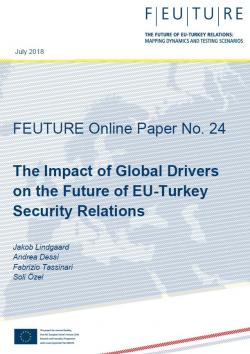The Impact of Global Drivers on the Future of EU-Turkey Security Relations
This paper examines whether global security dynamics will act as either centripetal forces to the Turkey-EU relations on threat perceptions and security concerns, keeping the relationship aligned, or whether they will act as centrifugal forces pushing Tukey and the EU further apart on security. More precisely, the paper surveys the roles of (i) the US and NATO, (ii) Russia, and (iii) global security shifts as well as new (in-)security trends in this context. The paper argues that these three groups of global security dynamics will push Turkey-EU relations in a more conflictual direction, if cooperation—often more out of necessity than want—will continue to keep the relationship away from the brink, resulting in a form of conflictual cooperation. The paper concludes with a few initial recommendations.
-
Dati bibliografici
Cologne, University of Cologne, luglio 2018, 37 p. -
In:
-
Numero
Online Paper 24
1. Introduction and analytical framework
2. Turkey, the US, NATO and the impact on EU-Turkey security relations
2.1 Drivers from history
2.2 Key areas of difference and alignment
2.3 Contours of a future scenario
3. The impact of Russia as a global security driver of Turkey-EU security relations
3.1 Drivers from history
3.2 Key areas of alignment and differences
3.3 Contours of a future scenario
4. Global security shifts and new (in-)security trends
4.1 Global security shifts
4.2 New trends in security threats
5. Global security-related drivers and a FEUTURE scenario
5.1 Global security-related drivers in sum
5.2 Conflictual cooperation – the most likely of the possible 2023 scenarios
6. Conclusion (and initial recommendations)
References




